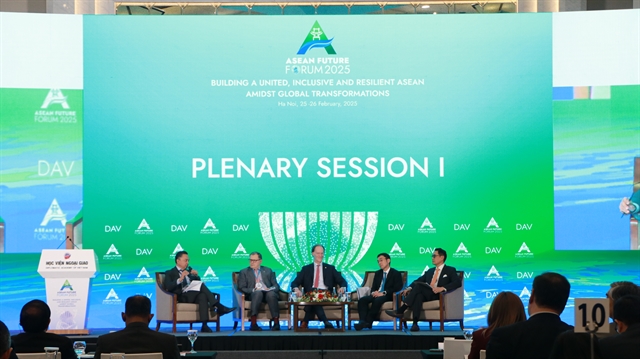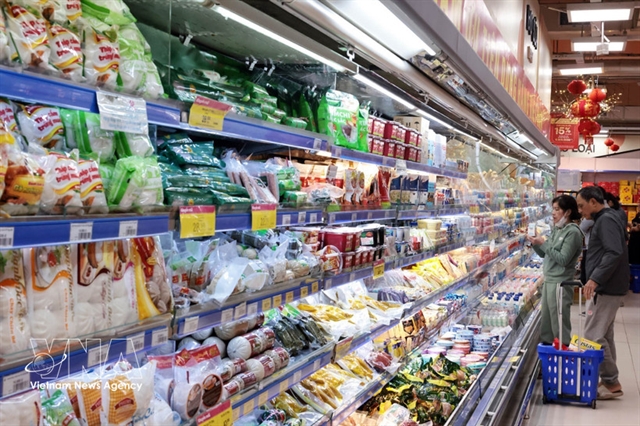 Life & Style
Life & Style

 |
| Officials and experts discuss the megatrends in ASEAN and the world at the ASEAN Future Forum 2025 in Hà Nội on Tuesday. — VNS Photo Nhật Hồng. |
HÀ NỘI — ASEAN would continue to serve as a beacon of peace in regional cooperation and integration, said Nguyễn Trung Thành, the former leader of Việt Nam’s ASEAN SOM (ASEAN Senior Officials' Meeting).
Speaking at the ASEAN Future Forum 2025 in Hà Nội on Tuesday, he expressed confidence that the Southeast Asian bloc would continue to be a force for convening and managing differences.
“Where there is confrontation and wondering, there is ASEAN playing as a force of centrality - and not only as a talk, but we have to walk effectively and deliver,” said Thành.
“That is where I see how ASEAN can continue to play an effective role in promoting multilateralism, peace, and inclusive and prosperous sustainable development,” said the Vietnamese official as he discussed the vision of ASEAN and the world in 2035 in a plenary panel at the forum.
ASEAN has been benefiting from the post-Cold War period with increasing openness, trade and integration, but the development needs in the current era also include demands for inclusion and sustainability, according to Professor Simon Tay, chairman of the Singapore Institute of International Affairs (SIIA).
However, there were notable changes in the global order, he said, adding that “we see a public crisis that no single country, not even the biggest power, can solve these problems on their own.”
“We see a world much more driven with problems and division than the world that ASEAN really grew up with and prospered,” he said.
“We grew in this time under international rule-based order, we integrated close together economically. As the world also moved toward globalisation, these are moving away from us, and we must reinforce our efforts.
“If the US and others increase tariffs, we must not do that among ourselves. We should reinforce ASEAN ourselves and with other partners,” said the professor as he also emphasised the need to address climate change impacts and the Myanmar issue.
Amid global turbulences, ASEAN was also facing challenges with ageing societies, digitalisation, transnational and border threats and geopolitical tension, noted Thai foreign minister Maris Sangiampongsa in his keynote speech at the panel.
“It is imperative that ASEAN continues to uphold its centralities for cohesiveness, to reinforce the ASEAN central regional architecture,” he said.
ASEAN should also continue to promote open, transparent and inclusive dialogue among all players in the region through existing platforms, he added, explaining that this would help ensure the relevance of the bloc in navigating through the fast-changing landscape, while also building strategic trust, reducing misunderstanding and preventing tension escalation.
“Thailand will continue to work with all ASEAN member states to realise our common visions of a resilient, innovative, dynamic and people-centred ASEAN community that embodies the hope and aspirations of all ASEAN citizens,” said the Thai minister.
Charles Hay, Southeast Asia & Pacific Directorate, Foreign, Commonwealth & Development Office (FCDO), the United Kingdom, said the UK sought to advance relations with ASEAN, as the numbers speak for themselves - the size of the population, the economic growth, the opportunities here.
“For British businesses, there is a general interest in almost every country in ASEAN, but there's also an interest in ASEAN as a whole, and the work that you're doing and have been doing over the years in terms of improving connectivity, improving the business environment, that is immensely attractive to investors from the UK,” the official said.
He also touched on the issue of energy use and climate change, both of which pose opportunities and threats to ASEAN, as an entity and as a region.
“The demand for power is increasing extra year on year, despite all the efforts we've made to switch to renewables, I heard the other day talking to an expert in the energy sector, that the world is burning not just more oil and more gas, but also more coal and more wood than at any time, and that poses a huge threat to the countries of ASEAN particularly vulnerable to climate change, the large number of people living in exposed regions, dependent on agriculture and forestry," the official added.
Hay stressed that this was an area where no country could tackle the problems alone and it's “absolutely a requirement that we work together and we work globally to address these challenges.” — VNS




